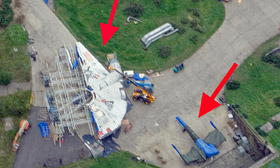AstraZeneca has wasted little time in rejecting a new takeover bid worth £64bn from Pfizer, after its US rival took the battle straight to 10 Downing Street.
David Cameron declared that the government had received "robust" assurances from Pfizer on UK jobs and investment. "We should be really proud of [AstraZeneca] but, of course, the decision on any merger is a decision for the two companies and their shareholders," he said. He spoke to AstraZeneca's chairman, Leif Johansson, shortly after Pfizer's improved offer was rejected.
The Anglo-Swedish company's swift rejection raised the possibility that Viagra maker Pfizer could go hostile and appeal directly to AstraZeneca's shareholders. Hours earlier, the world's largest pharmaceutical group stressed that it wanted to "pursue a friendly, negotiated transaction that can be recommended by both our boards".
The science minister, David Willetts, said Pfizer had "moved a long way from where they were a week ago". Business secretary Vince Cable, who began the week calling for more protection of British businesses, told the BBC: "We've now received some assurances from the company that they will strengthen the British science base, they will protect British manufacturing.
"We need to look at that in detail, we need to look at the small print, we need to establish that it is binding, but as far as it goes, on the basis of what we've seen so far, it is welcome and encouraging."
However, Labour's shadow business secretary Chuka Umunna said: "Do we really want a jewel in the crown of British industry, our second biggest pharmaceutical firm, to basically be seen as an instrument of tax planning?"
Johansson said the board had no hesitation in rejecting the proposal, a few hours after it was made. It believed the new offer, raised from January's £58.8bn bid, was still too low. It noted that the large share element and the tax structure of the new company remain unchanged.
Pfizer offered £50 a share, including £15.98 in cash. This is about 32% of the price, only slightly higher than the previously offered 30%. City analysts have said a bid of £53-56 a share might tempt AstraZeneca shareholders. Panmure Gordon analyst Savvas Neophytou said on Friday he expected the offer to be raised towards £55.
AstraZeneca shares were up 10p to £48.27 in afternoon trading on Friday.
Edison analyst Mick Cooper said: "The response from AstraZeneca is not unexpected given that they cannot look as though they are rolling over at the first hurdle. The board is replete with former senior investment bankers who know how to run a good defence strategy." The board includes former Barclays boss John Varley, ex-UBS banker baroness Shriti Vadera and Swedish banker Marcus Wallenberg.
Analysts are predicting a drawn-out takeover battle. Rae Ellingham at Charles Stanley advised investors with large holdings to lock in profits, saying there is no certainty a deal will happen.
Willetts said on Friday that the government had been having "very tough conversations" with Pfizer and had "made it clear to them that the British government attaches great importance to the R&D activities here in Britain and to manufacturing".
"We have made it absolutely clear to Pfizer that we have a life sciences strategy," he said on BBC Radio 4's Today programme. "It's aimed at boosting investment in Britain. It's working… We think a smart company would want to invest [in Britain]."
Pfizer's Scottish-born boss, Ian Read, wrote in a letter to David Cameron that he viewed the company's "partnership with the UK government as a critical part of this potential transaction". "We believe the industrial logic for a combination between Pfizer and AstraZeneca is compelling," he wrote.
Read has just returned to the US after a two-day trip to London, where he met the chancellor, George Osborne, other government ministers and major AstraZeneca shareholders.
"Establishing the world's largest research-based pharmaceutical company in the UK, together with the commitments made in this letter represent a strong indicator of the incentives that your government has created to attract successful business to the UK," Read wrote.
He sought to reassure the government of Pfizer's long-term commitment to the UK. While the global head office would be in New York and the new company would have a New York stock market listing, it would be incorporated in the UK. Pfizer pledged to complete the planned AstraZeneca scientific campus in Cambridge and to base European and some global research and development in the UK. It promised to employ at least 20% of the combined company's total R&D workforce in the UK, and to locate some manufacturing in Britain, including AstraZeneca's commercial site in Macclesfield. It invited at least two AstraZeneca board members to join the board of the new company.
Umunna accused Pfizer of asset-stripping and making cuts in research facilities after previous acquisitions. The company cuts tens of thousands of jobs after each of its main three acquisitions: Warner-Lambert, Pharmacia and Wyeth. The 2011 closure of the bulk of its Sandwich lab in Kent – which invented Viagra – with the loss of 1,500 jobs caused an outcry.
AstraZeneca employs 6,700 people in the UK. Former Labour science minister Lord Sainsbury said any assurances would be "frankly meaningless" given Pfizer's history of asset-stripping.
Allan Black, of the GMB union which represents workers at AstraZenea's Macclesfield factory, said of Pfizer's latest pledges: "Similar undertakings were given by US multinationals before which have proved to be worthless."
Pfizer would benefit from the UK's lower corporation tax rate (21%, or 20% from next year, versus 38% in the US), which could save it $1.4bn a year in tax. It is also attracted by the "patent box", a lucrative tax break for new products developed in the UK. By 2017, companies will pay 10% tax on profits derived from UK-held patents.
Analysts and tax experts say Pfizer wants to avoid paying the high US rate of tax on billions of cash earned overseas. Tax specialist Heather Self of the law firm, Pinsent Masons, said: "Once the cash is offshore, the potential tax cost of repatriating it to the US makes it much more attractive to find other homes for it such as making foreign acquisitions."
Neophytou said Pfizer could be under time pressure to complete the deal, as Barack Obama has proposed a big move against tax inversions. At the moment, companies need to have more than 20% overseas ownership to be able to be incorporated elsewhere for tax purposes. This could rise to 50% under the US president's plans.
Former Conservative deputy prime minister Lord Heseltine also weighed into the takeover battle, saying: "Foreign takeovers can often be hugely helpful but every other advanced economy has mechanisms of some sort on a fail-safe basis to scrutinise foreign takeovers. We are the only country that doesn't. I think that is a mistake."
He told the BBC there were lots of questions that needed to be explored, including about the UK's science base, supply chains and employment prospects.
Pfizer and AstraZeneca investors would own approximately 73% and 27%, respectively, of the new parent company.





















